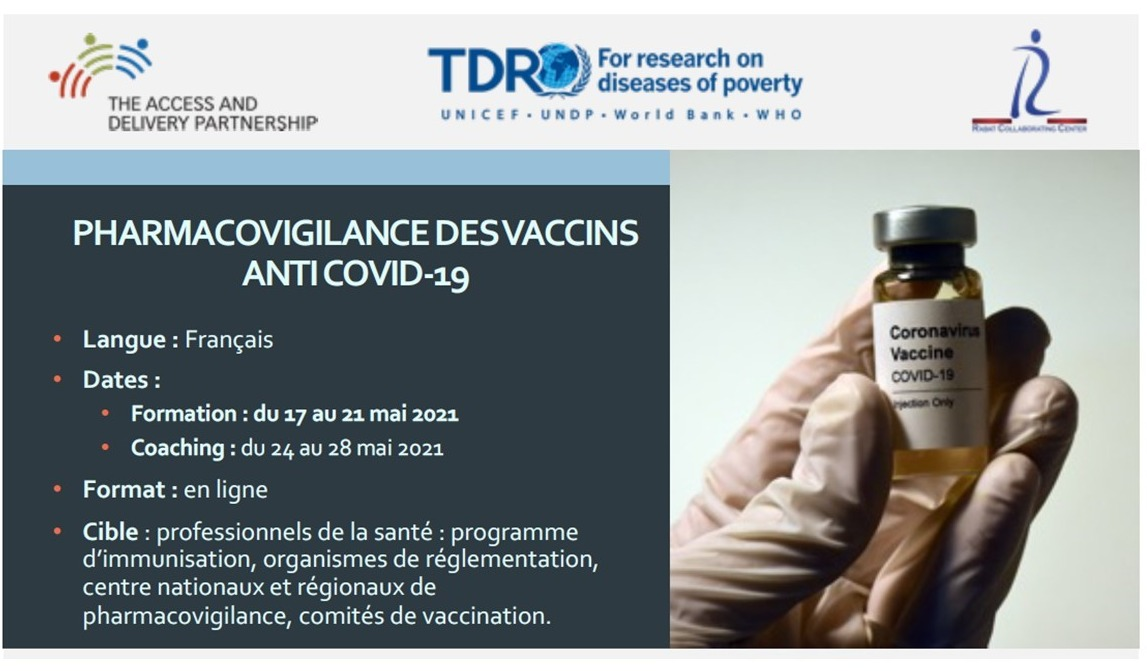As part of the Access and Delivery Partnership (ADP), TDR and the WHO Collaborating Centre for Strengthening Pharmacovigilance Practices in Morocco have developed an e-learning initiative to strengthen COVID-19 vaccine safety monitoring systems in African countries.
In the current phase of the COVID-19 pandemic, many countries are deploying or planning to deploy COVID-19 vaccines. Countries need to ensure that unexpected or severe reactions after vaccination are reported and investigated so that the vaccines continue to meet high safety standards. Many countries in Africa need to strengthen their vaccine safety practices at district, regional and national levels, as well as adapt global recommendations to the national context.
A training project based on South-South collaboration was developed to address this issue in order to contribute to the overall strengthening of COVID-19 vaccine safety monitoring systems in low- and middle-income countries. This will ultimately be beneficial for the delivery of all new vaccines.
Development of a train-the-trainer module
The project kicked off with the development of a train-the-trainer programme targeting national health staff with minimal knowledge and experience with pharmacovigilance practices, who are expected to be delivering in-country trainings. The WHO Collaborating Centre for Strengthening Pharmacovigilance Practices in Rabat, Morocco, led the development of the training module based on WHO recommendations, building on its extensive experience with COVID-19 vaccinations from earlier this year.

As travel and meeting restrictions continue to impact many countries, it was necessary to rely on an on-line format for the trainings. The training course is taking place in an interactive virtual meeting format and involves different teaching methods, including direct interactions with teaching staff, self-training sessions, daily quizzes, pre- and post-training tests and group webinars. The module covers five topics:
a) a review of basic pharmacovigilance competences,
b) the fundamentals of vaccine safety, of vaccine safety monitoring and communication,
c) the specificities related to COVID-19 vaccines,
d) case studies and exercises on notification forms and reporting and on teaching methods, and
e) communication.
Training materials for trainers were also developed for in-country cascade trainings on the importance of vaccine safety monitoring in the context of COVID-19 vaccine deployment, adverse event after immunization (AEFI) identification, management and reporting.
Training delivery
The first week of training was held on 17-21 May with registered participants from six African countries: Senegal, Burkina Faso, Benin, Niger, Togo and Djibouti.
Thirty-nine participants actively participated in the course. A total of 36 participants successfully passed the course and were certified.
Coaching for developing country-specific national training plans and training kits
Additional support was provided for the ADP focus countries of Senegal and Burkina Faso. Teaching staff from the WHO Collaborating Centre in Rabat provided technical assistance over 10 days to prepare in-country cascade trainings for health care workers involved in vaccination activities.
Presentation plans on four key topics were shared with countries so they can be adapted to their national context: general principles and organization of pharmacovigilance, pharmacovigilance-related to national COVID-19 vaccination campaigns, AEFI detection and management, and reporting and communication of AEFI. Additionally, each country team prepared a draft national training plan on vaccine AEFI identification and reporting along with a budget. This will facilitate requests for funding.
Twelve participants from Senegal and 10 from Burkina Faso (70% were pharmacists and 30% medical doctors) participated in the second phase of the training programme, which resulted in country-specific training plans on COVID-19 vaccine safety monitoring and a training kit with ready-to-use tools adapted to the local context.
Implementation of the training kit in Senegal
Senegal’s Directorate of Pharmacy and Medicine has started immediate implementation of the training kit for its national training programme. Two training sessions for 60 pharmacovigilance focal points at district and regional level from 14 regions will take place from 21 to 26 June 2021. The training will focus on AEFI in the context of COVID-19 vaccines.
“The training materials are invaluable for strengthening our vaccine safety monitoring efforts as we prepare to roll out COVID-19 vaccines nationally in the coming months,” said Dr Aminata Diarra Lô, Head of the Pharmacovigilance Division of Senegal’s Directorate of Pharmacy and Medicine."
Next steps
The training module and teaching materials are being translated into English. The next training session will take place in July for English-speaking countries.
For more information, please contact Dr Corinne Merle.
This article was originally published in https://tdr.who.int

